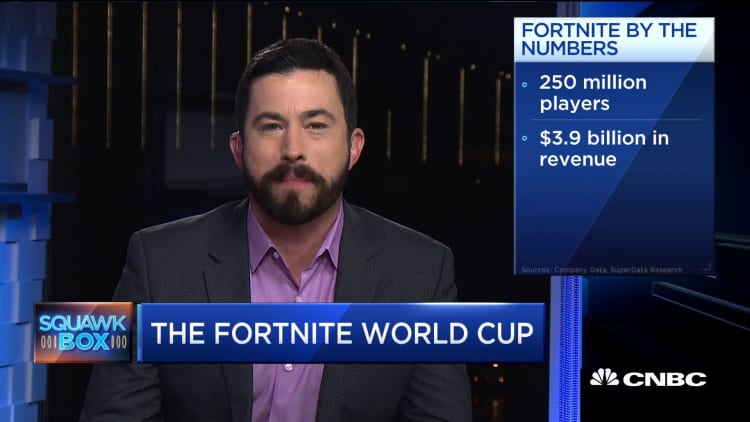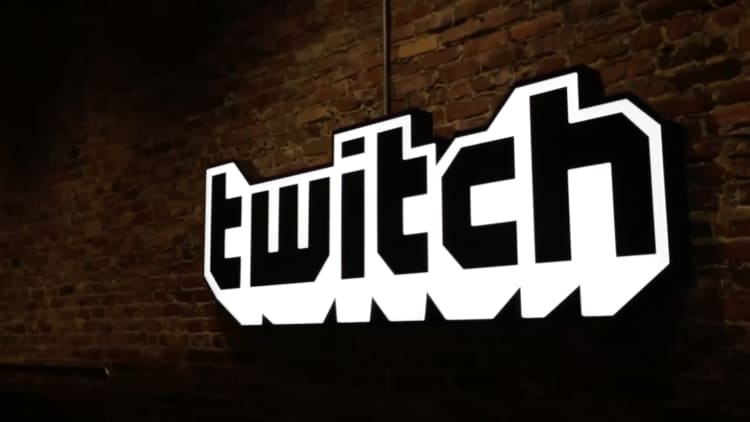SPONSOR: Enthusiast Gaming Holdings Inc. (TSX-V: EGLX) Uniting gaming communities with 80 owned and affiliated websites, currently reaching over 75 million monthly visitors. The company exceeded 2018 target with $11.0 million in revenue. Learn More

From casual gaming to making millions: Inside the fast-growing esports industry
- Giorgio Calandrelli, 26, used to play the game Fortnite solely for “fun.†That was until his debut competition under a major esports brand last year.
- The Italian professional gamer, who is known to his fans as “Pow3r,†says he faced numerous setbacks in his opening bid to impress his new team, London-based Fnatic.
“I f**ked up,†he says with candor. An accidental misclick that pulled him out of his game also cost him a match. “The tournament is about consistency and getting the most kills as possible to get in the top 20,†Calandrelli told CNBC. Each move he makes matters.
Luckily for Calandrelli, he was afforded a comeback, accruing 20 online kills in a “special challenge†game that won him a lucrative $10,000 prize. Altogether, Fnatic’s Fortnite team managed to bag more than $100,000 over the course of the tournament.
And that’s just the tip of a growing iceberg. Fnatic says that prize pools in the first year of a Fortnite competition have ranged from $1 million to $20 million. Last year, the game’s developer Epic Games announced it was committing $100 million for Fortnite tournament prize pools from 2018 to 2019.
But while esports has grown up as an industry over the past decade, in terms of both money and viewership, its stars — and fans — seem to be getting younger and younger.
Last month saw 16-year-old gamer Kyle “Bugha†Giersdorf haul a huge $3 million reward after coming first place in the Fortnite World Cup, the championship dedicated to the popular battle royale game.
Fortnite has helped reignite interest in esports, with titans of the entertainment industry struggling to figure out how to catch up. Comcast, for example, recently announced it would build a $50 million arena designed to accommodate esports tournaments.
Industry research group Newzoo estimates esports revenues will top $1 billion for the first time this year, climbing 27% from last year’s figure. It’s a phenomenon that’s helped people transition from playing casually in their bedrooms to playing for money in major competitions.
“It’s just like any sport,†Sam Mathews, Fnatic’s co-founder and CEO, told CNBC. “You have the amateurs, and then the semi-amateur pros; then semi-pro and then you get up to pro. It really takes that sort of skill level and attitude. Attitude is a huge part of any sport.â€
“When we scout players, we need to see that they go to trials, we need to check that they have the right attitude. And eventually if they’re good enough they make it onto our main squad.â€
‘Common ground’
Competitive gamers’ earnings don’t stop at prize pools. There are esports team contracts, sponsorship deals and merchandise on top of that.
Teespring is a platform dedicated to making and selling customized merchandise, with a particular focus on so-called online “influencers.â€
Chris Lamontagne, the firm’s CEO, told CNBC it’s formed a strong base of customers involved in gaming. Lamontagne said the benefit of customized merchandise for gamers is it creates “common ground†between them and their fan base.
“There’s a lot of content that can be created just given there’s a mutual connection over the game itself,†he said. He added there are “a couple of big esport teams†using Teespring, without identifying which ones.
Beyond Fortnite, there are plenty of games that have become pillars of the competitive gaming landscape. These include Dota 2, League of Legends, Counter-Strike: Global Offensive and Overwatch.

watch now VIDEO01:20 Sixteen-year-old wins Fortnite World Cup and takes home $3 million
And esports has stretched out beyond staged tournaments, thanks to the advent of live streaming. Calandrelli said he often does live broadcasts on Amazon-owned platform Twitch, a venue which he says helps him connect with his fans.
“Something in the gaming world working really well is streaming,†Lamontagne said. Teespring has signed partnerships with Google’s YouTube and Twitch that let content creators sell their merchandise through its service.
One of the biggest streamers out there right now is Tyler “Ninja†Blevins, who managed to rake in nearly $10 million last year, largely thanks to fan donations and paid subscriptions on Twitch and ad revenue on YouTube.
Blevins helped Fortnite become an esports phenomenon in its own right — with almost 250 million registered users as of March 20, the game’s influence can’t be understated.
And the streaming battlefield could be about to see a shakeup. Ninja recently made the surprise announcement that he would be shifting from Twitch — where he’s pulled in about 14.7 million followers — to Microsoft’s live streaming service Mixer.
Diversification
Mathews, himself a gamer, said there’s plenty of money to be made on the part of esports organizations as well as the players themselves. Fnatic for example has diversified into hardware, selling everything from professional-grade keyboards to gaming headsets.
The company bought gaming hardware manufacturer Func back in 2015, and sells its gear in 400 Best Buy stores in the U.S. It’s also got a presence in South Korea and Japan, Mathews said.

watch now
“To this day we’re the only esports organization to own its own peripheral hardware business,†he said. “It’s a massively growing part of our revenue stream and something we really believe in.â€
Esports players are also making moves in the music industry. Fnatic’s Calandrelli said he is in talks with “one of the biggest†group of rappers in his country on collaborating with them, and has previously done tie-ups with record labels like Virgin EMI and Atlantic Records.
Calandrelli declined to disclose details of his earnings when asked by CNBC.
According to the British Esports Association, some of the top esports players in the world include Saahil “UNiVeRsE†Arora, with estimated income of over $2.6 million, Lee “Faker†Sang-hyeok, with $890,000 in earnings, and Robin “flusha†Ronnquist, who earns an estimate of $388,000.
Source: https://www.cnbc.com/2019/08/12/inside-the-fast-growing-esports-industry-fnatic-fortnite-and-twitch.html
Tags: CSE, Dota 2, EA sports, egaming, esports, Fortnite, LOL, stocks, tsx, tsx-v